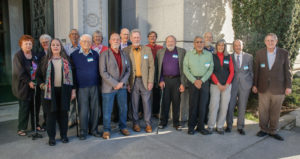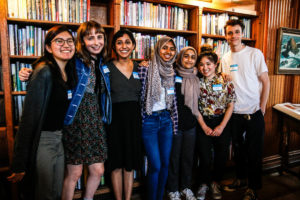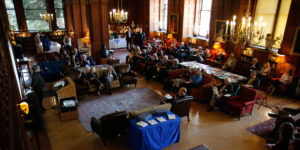Every April, as the school year is fast coming to a close, the Oral History Center hosts its very own commencement ceremony. For seven years running, we have produced this event to celebrate the oral history class of that year — meaning we thank and honor those people whose interviews were completed in the previous year. The Oral History Class of 2019 numbered some 111 individuals who participated in a number of oral history projects ranging from environmental regulation and wine growing to philanthropy and scientific discovery to opera and an army base.
This very special event gives us an opportunity to reflect on what we do — the meaning of oral history to us, to our narrators, and to the community at large. This year we were thinking about how oral histories “make history” in several ways: The interviews, once recorded and made available to the public, provide the raw material that is then used for the making of historical narratives by historians, journalists, students, you name it; the interviews offer historical narratives and analysis on their own, and thus they are one account of history, maybe the best first draft of history; and, perhaps most importantly, those we interview have already made history by living their lives — by building corporations, participating in social movements, creating works of art, running for political office, serving in the military, mentoring students . . . by making wine! History happens — and has happened — but through the work of the Oral History Center, and the generous and essential contributions of our narrators, history is made.

In advance of the event, I asked my colleagues for some examples of moments from their interviews when history was made — when something was told that seemed new to the historical record or in some way demanded a rethinking of it; when a narrator provided an account of a previously unrecognized contribution made — really any example of when history was made.
Amanda Tewes, in her first interview for the center, interviewed Jeanne Rose, who joined us the for event, which was held on this year on Thursday, April 25. Jeanne is a remarkable woman who, in her interview, provided deep insight into something that most people think they know well: the 1960s counterculture. In her telling, we learn of a loose-knit group who were the first 100 to populate the Haight-Ashbury, their deep connections to Big Sur, and how they began to change history with the “Summer of Love” in 1967. We further learn that 60s counterculture didn’t die at the infamous and bloody Altamont concert (which she attended) as the majority of her interview covers the 1970s and beyond when she became an influential herbalist and aromatherapist. With Jeanne Rose, the ideals and the spirit of the 60s live on. Jeanne Rose made history.

Maggie Deng, Carla Palassian, Gurshaant Bassi, Tasnima Naoshin, Aamna Haq, Laurel Fujii, Ben Satzman. Not pictured: Yarelly Bonilla-Leon, Cindy Jin, KD Mireles, Mason Osberg.(Photo by J.Pierre Carrillo for the UC Berkeley Library)
Todd Holmes, a historian with the Center since 2016, has created a remarkable project documenting the origins of the academic field of Chicano/a Studies, and for this he interviewed Ed Escobar, an Arizona State professor. In his oral history, Escobar tells how he pioneered some of the earliest Latino history courses — out of necessity because there were none. Teaching on the East Coast and then the midwest he learned that the Mexican American experience did not resonate like it did in California. But the Cuban, Puerto Rican, Dominican did. So he put together one of the first Latino history classes on those regions, expanding the definition of Latino and Latino studies in the process. Ed Escobar made history.

We have been fortunate to partner with the East Bay Regional Park District for a few years now and we’ve done a few dozen interviews already — covering many different topics from ranching to public education. Shanna Farrell, who is the project director and lead interviewer, shared with me a moment in her interview with Lawson Sakai. Sakai’s parents were from Japan, so in World War II, his family left the mandated West Coast exclusion area to avoid internment, ultimately settling in Colorado. They returned to California and to farming after the war, but with no money and an unwelcoming attitude of locals, this wasn’t easy. Enter Driscoll Farms, which is a larger grower of fruits today. Immediately after the war, they offered the returning Japanese-Americans a good deal, which included a 50/50 split on profits from the strawberry harvest. According to Sakai, this helped many families back on their feet after the war, allowing them to earn enough money to buy their own farms and thus independence. Shanna said, “I scoured my food history books and didn’t find any information about this. I felt like I had stumbled upon a hidden historical gem.” Lawson Sakai made history.
This past year we renewed our long-running partnership with the Sierra Club to document the organization’s history, and Roger Eardley-Pryor conducted two interviews this year, one with former president Michele Perrault. Roger recalled for me how this interview provides a unique and personal window into the international dimensions of environmentalism. Perrault told stories of traveling to the Soviet Union, China, and India in the early 1990s where she and her colleagues networked with proto-environmental groups, teaching them how to organize and what the key issues were. Their work resulted in, among other things, the creation of some of the first nature preserves in those countries and the establishment of the robust network that is in place today. Michele Perrault made history.

In the coming weeks and months, we will release the oral histories that are not already posted online. This past year we conducted at least 500 hours of new interviews and we are deeply grateful for the support of numerous individuals and institutions for making this work possible. Soon we will begin to post the names of these sponsors on our website so you can thank them too. In the meantime, enjoy the photos and our video from the commencement, highlighting interviews from the Oral History Center Class of 2019.
Our 10-minute video features highlights from the interviews of all of the narrators who were able to attend commencement, plus some bonus interviews. Our remarkable narrators share their insights about nature, science, art, the university, wine making, and more.
Martin Meeker, Charles B. Faulhaber Director, Oral History Center, UC Berkeley
Over the decades, the Oral History Center has conducted more than 4,000 interviews on almost every topic imaginable. As part of UC Berkeley’s commitment to open access, the transcripts are available to researchers and the public at no cost, and almost all of the transcripts are available online. Search our vast collection.